Legal Aspects of International Trade and Enterprise
VerifiedAdded on 2022/12/30
|10
|2676
|89
AI Summary
This report analyzes the legislative regulatory framework of Intel, a major American organization, and evaluates the key legislations that apply to its operations. It also examines how international treaties, conventions, and agreements affect its products and services. The report provides insights into the taxation policy, Corporations Act 2001 (Cth), employment laws, and the Competition and Consumer Act 2010 (Cth) that Intel must comply with in Australia. Additionally, it discusses the impact of treaties such as the Australia-United States Free Trade Agreement (AUSFTA), conventions between the United States and Australia, the United Nations Framework Convention on Climate Change (UNFCCC), and the ASEAN-Australia-New Zealand FTA (AANZFTA) on Intel's operations.
Contribute Materials
Your contribution can guide someone’s learning journey. Share your
documents today.
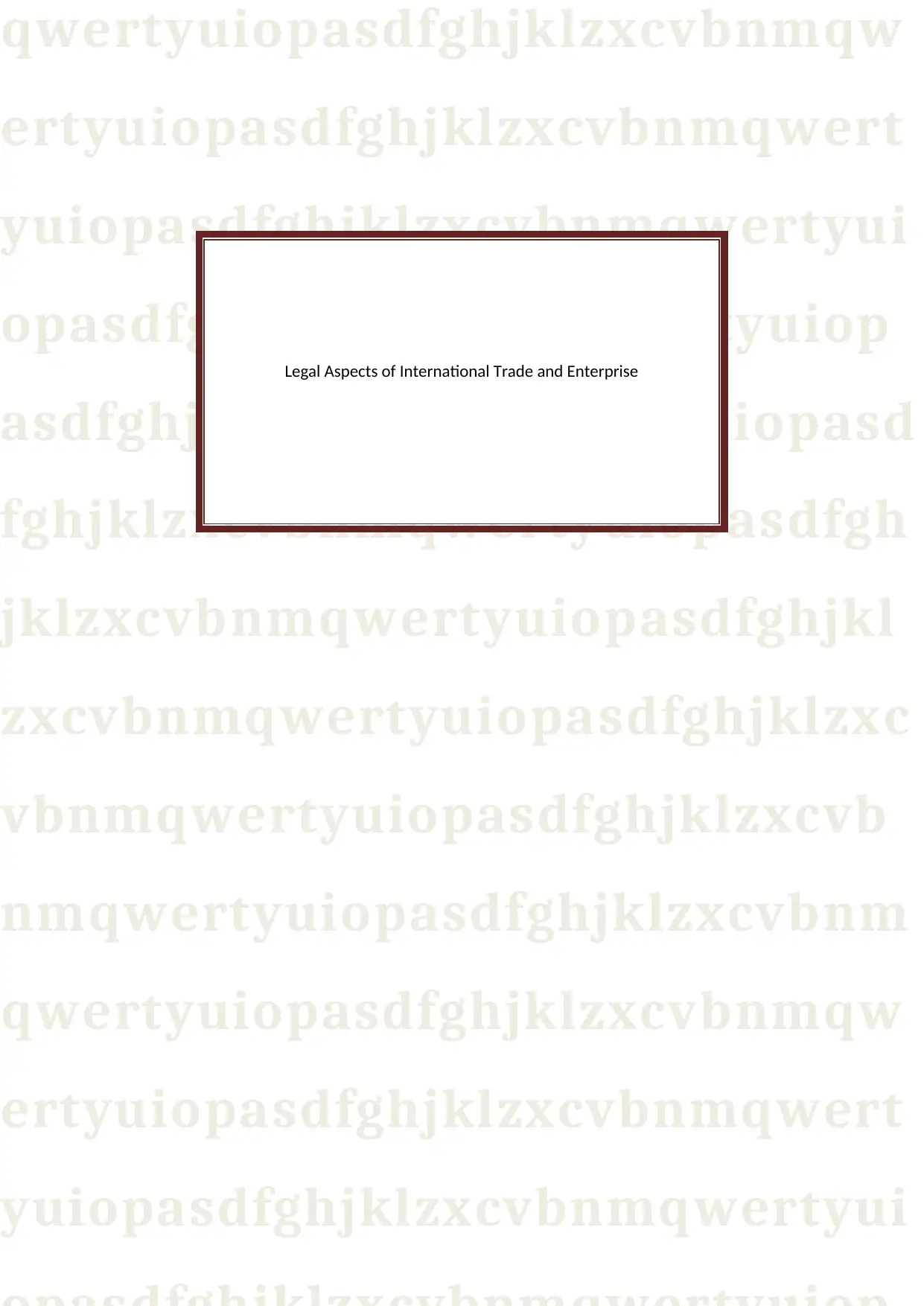
qwertyuiopasdfghjklzxcvbnmqw
ertyuiopasdfghjklzxcvbnmqwert
yuiopasdfghjklzxcvbnmqwertyui
opasdfghjklzxcvbnmqwertyuiop
asdfghjklzxcvbnmqwertyuiopasd
fghjklzxcvbnmqwertyuiopasdfgh
jklzxcvbnmqwertyuiopasdfghjkl
zxcvbnmqwertyuiopasdfghjklzxc
vbnmqwertyuiopasdfghjklzxcvb
nmqwertyuiopasdfghjklzxcvbnm
qwertyuiopasdfghjklzxcvbnmqw
ertyuiopasdfghjklzxcvbnmqwert
yuiopasdfghjklzxcvbnmqwertyui
Legal Aspects of International Trade and Enterprise
ertyuiopasdfghjklzxcvbnmqwert
yuiopasdfghjklzxcvbnmqwertyui
opasdfghjklzxcvbnmqwertyuiop
asdfghjklzxcvbnmqwertyuiopasd
fghjklzxcvbnmqwertyuiopasdfgh
jklzxcvbnmqwertyuiopasdfghjkl
zxcvbnmqwertyuiopasdfghjklzxc
vbnmqwertyuiopasdfghjklzxcvb
nmqwertyuiopasdfghjklzxcvbnm
qwertyuiopasdfghjklzxcvbnmqw
ertyuiopasdfghjklzxcvbnmqwert
yuiopasdfghjklzxcvbnmqwertyui
Legal Aspects of International Trade and Enterprise
Secure Best Marks with AI Grader
Need help grading? Try our AI Grader for instant feedback on your assignments.
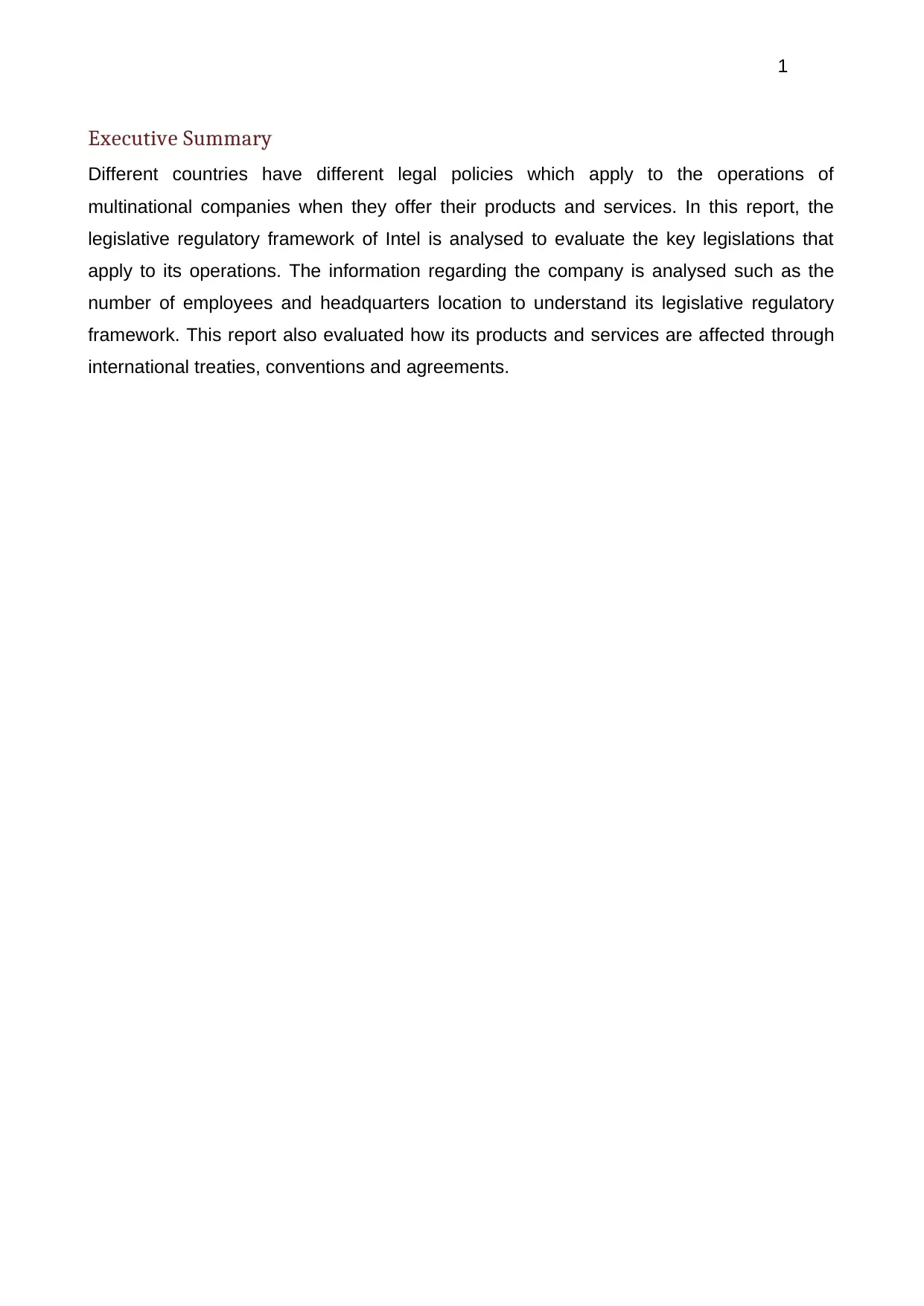
1
Executive Summary
Different countries have different legal policies which apply to the operations of
multinational companies when they offer their products and services. In this report, the
legislative regulatory framework of Intel is analysed to evaluate the key legislations that
apply to its operations. The information regarding the company is analysed such as the
number of employees and headquarters location to understand its legislative regulatory
framework. This report also evaluated how its products and services are affected through
international treaties, conventions and agreements.
Executive Summary
Different countries have different legal policies which apply to the operations of
multinational companies when they offer their products and services. In this report, the
legislative regulatory framework of Intel is analysed to evaluate the key legislations that
apply to its operations. The information regarding the company is analysed such as the
number of employees and headquarters location to understand its legislative regulatory
framework. This report also evaluated how its products and services are affected through
international treaties, conventions and agreements.
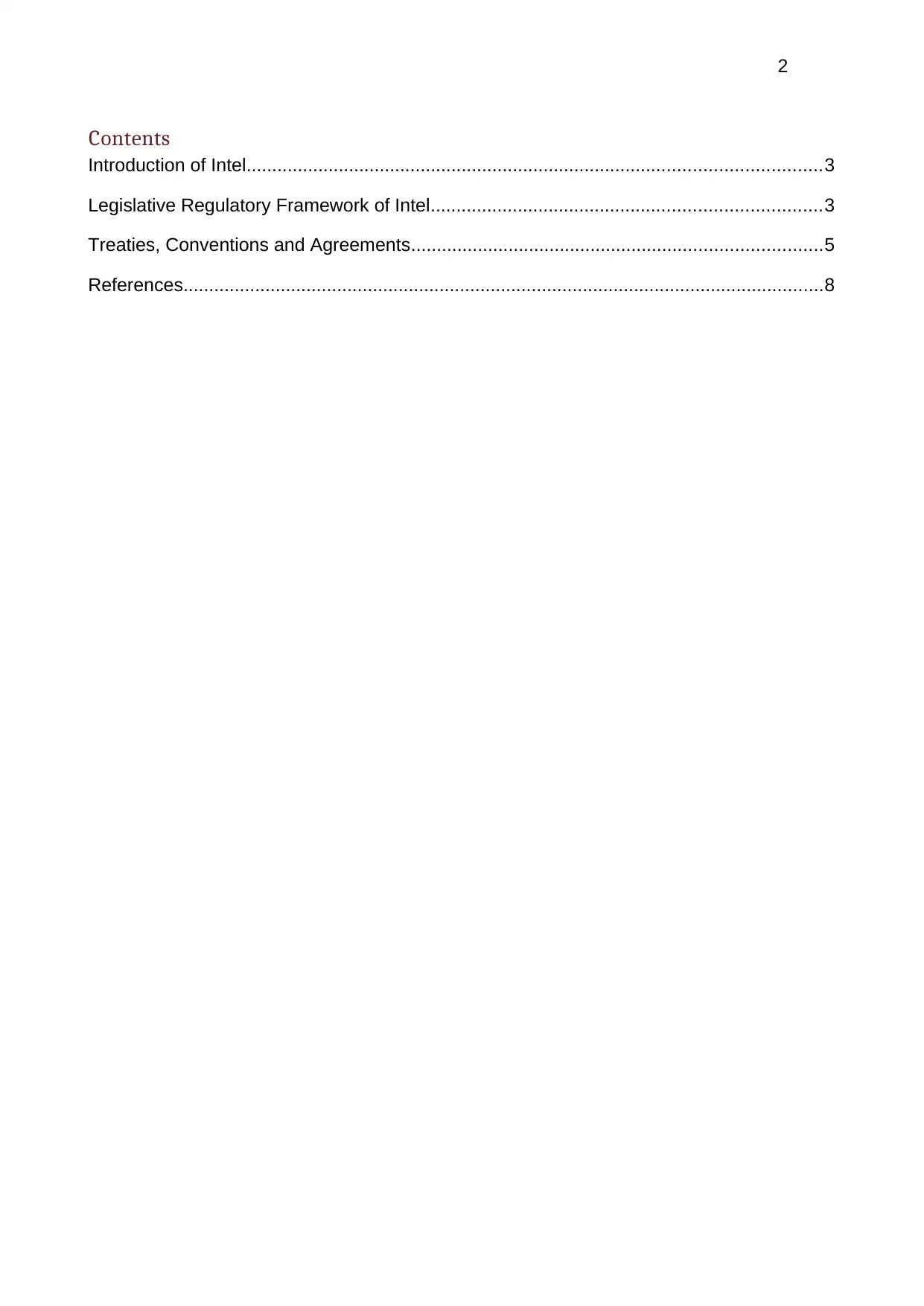
2
Contents
Introduction of Intel................................................................................................................3
Legislative Regulatory Framework of Intel............................................................................3
Treaties, Conventions and Agreements................................................................................5
References.............................................................................................................................8
Contents
Introduction of Intel................................................................................................................3
Legislative Regulatory Framework of Intel............................................................................3
Treaties, Conventions and Agreements................................................................................5
References.............................................................................................................................8
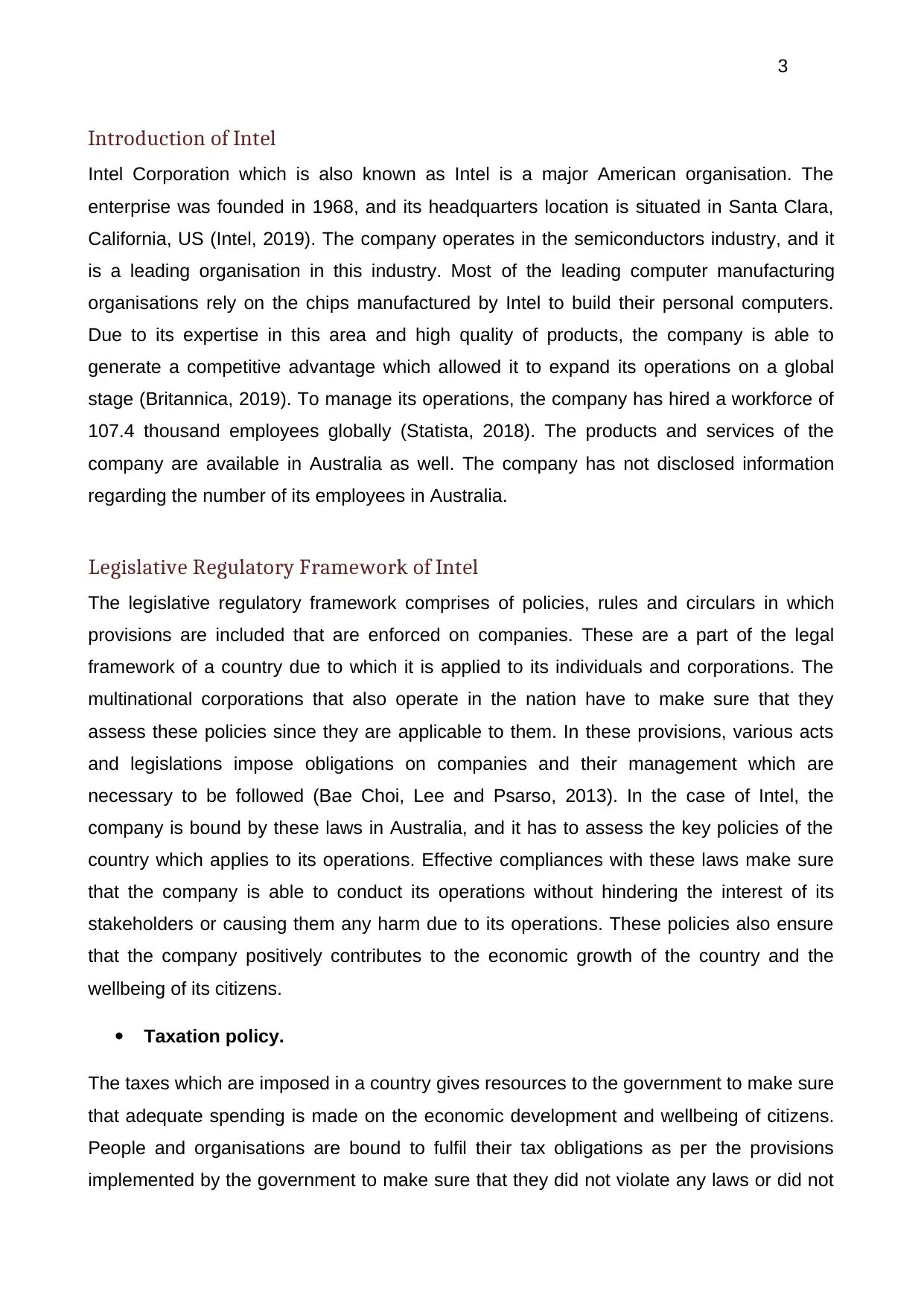
3
Introduction of Intel
Intel Corporation which is also known as Intel is a major American organisation. The
enterprise was founded in 1968, and its headquarters location is situated in Santa Clara,
California, US (Intel, 2019). The company operates in the semiconductors industry, and it
is a leading organisation in this industry. Most of the leading computer manufacturing
organisations rely on the chips manufactured by Intel to build their personal computers.
Due to its expertise in this area and high quality of products, the company is able to
generate a competitive advantage which allowed it to expand its operations on a global
stage (Britannica, 2019). To manage its operations, the company has hired a workforce of
107.4 thousand employees globally (Statista, 2018). The products and services of the
company are available in Australia as well. The company has not disclosed information
regarding the number of its employees in Australia.
Legislative Regulatory Framework of Intel
The legislative regulatory framework comprises of policies, rules and circulars in which
provisions are included that are enforced on companies. These are a part of the legal
framework of a country due to which it is applied to its individuals and corporations. The
multinational corporations that also operate in the nation have to make sure that they
assess these policies since they are applicable to them. In these provisions, various acts
and legislations impose obligations on companies and their management which are
necessary to be followed (Bae Choi, Lee and Psarso, 2013). In the case of Intel, the
company is bound by these laws in Australia, and it has to assess the key policies of the
country which applies to its operations. Effective compliances with these laws make sure
that the company is able to conduct its operations without hindering the interest of its
stakeholders or causing them any harm due to its operations. These policies also ensure
that the company positively contributes to the economic growth of the country and the
wellbeing of its citizens.
Taxation policy.
The taxes which are imposed in a country gives resources to the government to make sure
that adequate spending is made on the economic development and wellbeing of citizens.
People and organisations are bound to fulfil their tax obligations as per the provisions
implemented by the government to make sure that they did not violate any laws or did not
Introduction of Intel
Intel Corporation which is also known as Intel is a major American organisation. The
enterprise was founded in 1968, and its headquarters location is situated in Santa Clara,
California, US (Intel, 2019). The company operates in the semiconductors industry, and it
is a leading organisation in this industry. Most of the leading computer manufacturing
organisations rely on the chips manufactured by Intel to build their personal computers.
Due to its expertise in this area and high quality of products, the company is able to
generate a competitive advantage which allowed it to expand its operations on a global
stage (Britannica, 2019). To manage its operations, the company has hired a workforce of
107.4 thousand employees globally (Statista, 2018). The products and services of the
company are available in Australia as well. The company has not disclosed information
regarding the number of its employees in Australia.
Legislative Regulatory Framework of Intel
The legislative regulatory framework comprises of policies, rules and circulars in which
provisions are included that are enforced on companies. These are a part of the legal
framework of a country due to which it is applied to its individuals and corporations. The
multinational corporations that also operate in the nation have to make sure that they
assess these policies since they are applicable to them. In these provisions, various acts
and legislations impose obligations on companies and their management which are
necessary to be followed (Bae Choi, Lee and Psarso, 2013). In the case of Intel, the
company is bound by these laws in Australia, and it has to assess the key policies of the
country which applies to its operations. Effective compliances with these laws make sure
that the company is able to conduct its operations without hindering the interest of its
stakeholders or causing them any harm due to its operations. These policies also ensure
that the company positively contributes to the economic growth of the country and the
wellbeing of its citizens.
Taxation policy.
The taxes which are imposed in a country gives resources to the government to make sure
that adequate spending is made on the economic development and wellbeing of citizens.
People and organisations are bound to fulfil their tax obligations as per the provisions
implemented by the government to make sure that they did not violate any laws or did not
Secure Best Marks with AI Grader
Need help grading? Try our AI Grader for instant feedback on your assignments.
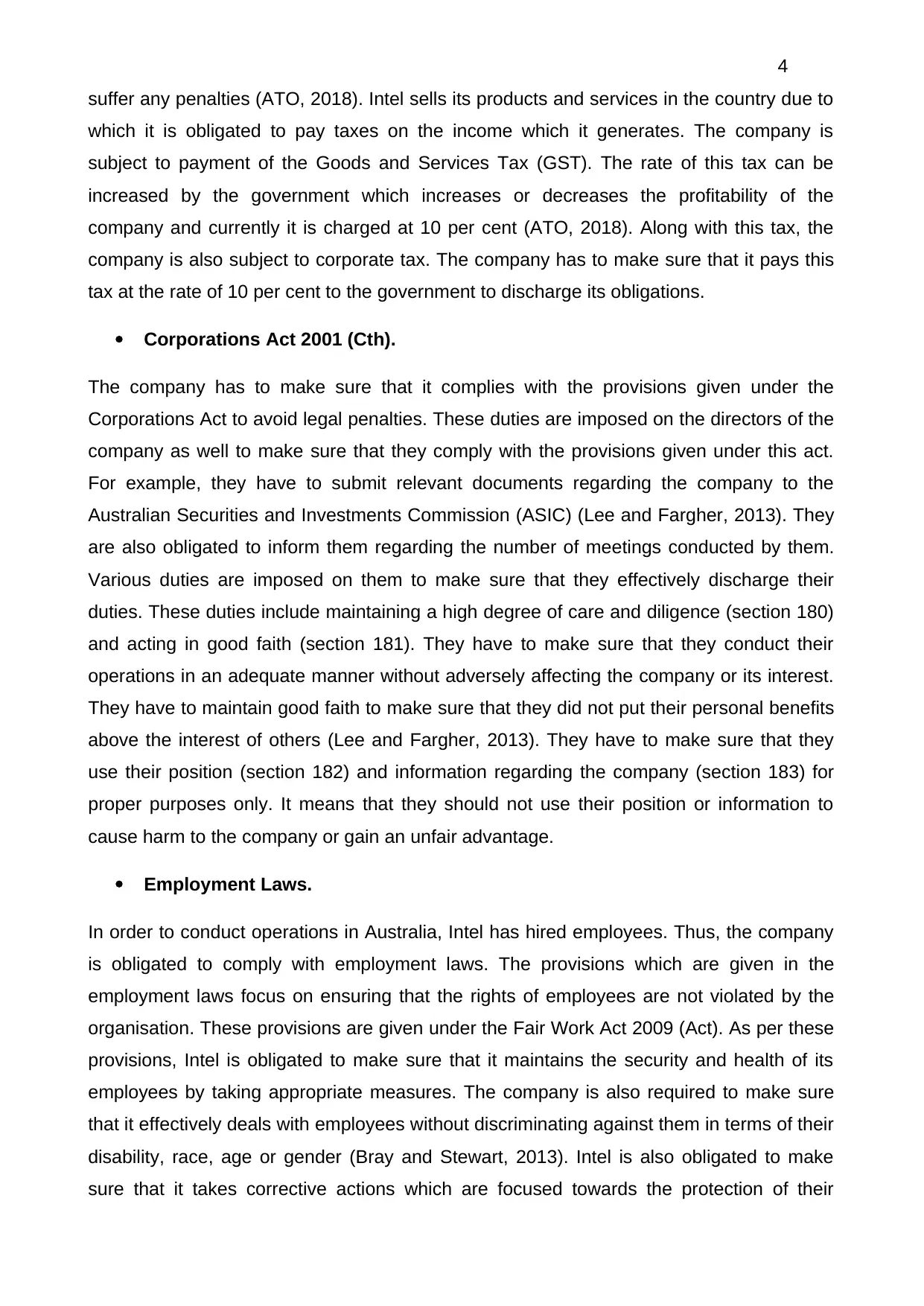
4
suffer any penalties (ATO, 2018). Intel sells its products and services in the country due to
which it is obligated to pay taxes on the income which it generates. The company is
subject to payment of the Goods and Services Tax (GST). The rate of this tax can be
increased by the government which increases or decreases the profitability of the
company and currently it is charged at 10 per cent (ATO, 2018). Along with this tax, the
company is also subject to corporate tax. The company has to make sure that it pays this
tax at the rate of 10 per cent to the government to discharge its obligations.
Corporations Act 2001 (Cth).
The company has to make sure that it complies with the provisions given under the
Corporations Act to avoid legal penalties. These duties are imposed on the directors of the
company as well to make sure that they comply with the provisions given under this act.
For example, they have to submit relevant documents regarding the company to the
Australian Securities and Investments Commission (ASIC) (Lee and Fargher, 2013). They
are also obligated to inform them regarding the number of meetings conducted by them.
Various duties are imposed on them to make sure that they effectively discharge their
duties. These duties include maintaining a high degree of care and diligence (section 180)
and acting in good faith (section 181). They have to make sure that they conduct their
operations in an adequate manner without adversely affecting the company or its interest.
They have to maintain good faith to make sure that they did not put their personal benefits
above the interest of others (Lee and Fargher, 2013). They have to make sure that they
use their position (section 182) and information regarding the company (section 183) for
proper purposes only. It means that they should not use their position or information to
cause harm to the company or gain an unfair advantage.
Employment Laws.
In order to conduct operations in Australia, Intel has hired employees. Thus, the company
is obligated to comply with employment laws. The provisions which are given in the
employment laws focus on ensuring that the rights of employees are not violated by the
organisation. These provisions are given under the Fair Work Act 2009 (Act). As per these
provisions, Intel is obligated to make sure that it maintains the security and health of its
employees by taking appropriate measures. The company is also required to make sure
that it effectively deals with employees without discriminating against them in terms of their
disability, race, age or gender (Bray and Stewart, 2013). Intel is also obligated to make
sure that it takes corrective actions which are focused towards the protection of their
suffer any penalties (ATO, 2018). Intel sells its products and services in the country due to
which it is obligated to pay taxes on the income which it generates. The company is
subject to payment of the Goods and Services Tax (GST). The rate of this tax can be
increased by the government which increases or decreases the profitability of the
company and currently it is charged at 10 per cent (ATO, 2018). Along with this tax, the
company is also subject to corporate tax. The company has to make sure that it pays this
tax at the rate of 10 per cent to the government to discharge its obligations.
Corporations Act 2001 (Cth).
The company has to make sure that it complies with the provisions given under the
Corporations Act to avoid legal penalties. These duties are imposed on the directors of the
company as well to make sure that they comply with the provisions given under this act.
For example, they have to submit relevant documents regarding the company to the
Australian Securities and Investments Commission (ASIC) (Lee and Fargher, 2013). They
are also obligated to inform them regarding the number of meetings conducted by them.
Various duties are imposed on them to make sure that they effectively discharge their
duties. These duties include maintaining a high degree of care and diligence (section 180)
and acting in good faith (section 181). They have to make sure that they conduct their
operations in an adequate manner without adversely affecting the company or its interest.
They have to maintain good faith to make sure that they did not put their personal benefits
above the interest of others (Lee and Fargher, 2013). They have to make sure that they
use their position (section 182) and information regarding the company (section 183) for
proper purposes only. It means that they should not use their position or information to
cause harm to the company or gain an unfair advantage.
Employment Laws.
In order to conduct operations in Australia, Intel has hired employees. Thus, the company
is obligated to comply with employment laws. The provisions which are given in the
employment laws focus on ensuring that the rights of employees are not violated by the
organisation. These provisions are given under the Fair Work Act 2009 (Act). As per these
provisions, Intel is obligated to make sure that it maintains the security and health of its
employees by taking appropriate measures. The company is also required to make sure
that it effectively deals with employees without discriminating against them in terms of their
disability, race, age or gender (Bray and Stewart, 2013). Intel is also obligated to make
sure that it takes corrective actions which are focused towards the protection of their
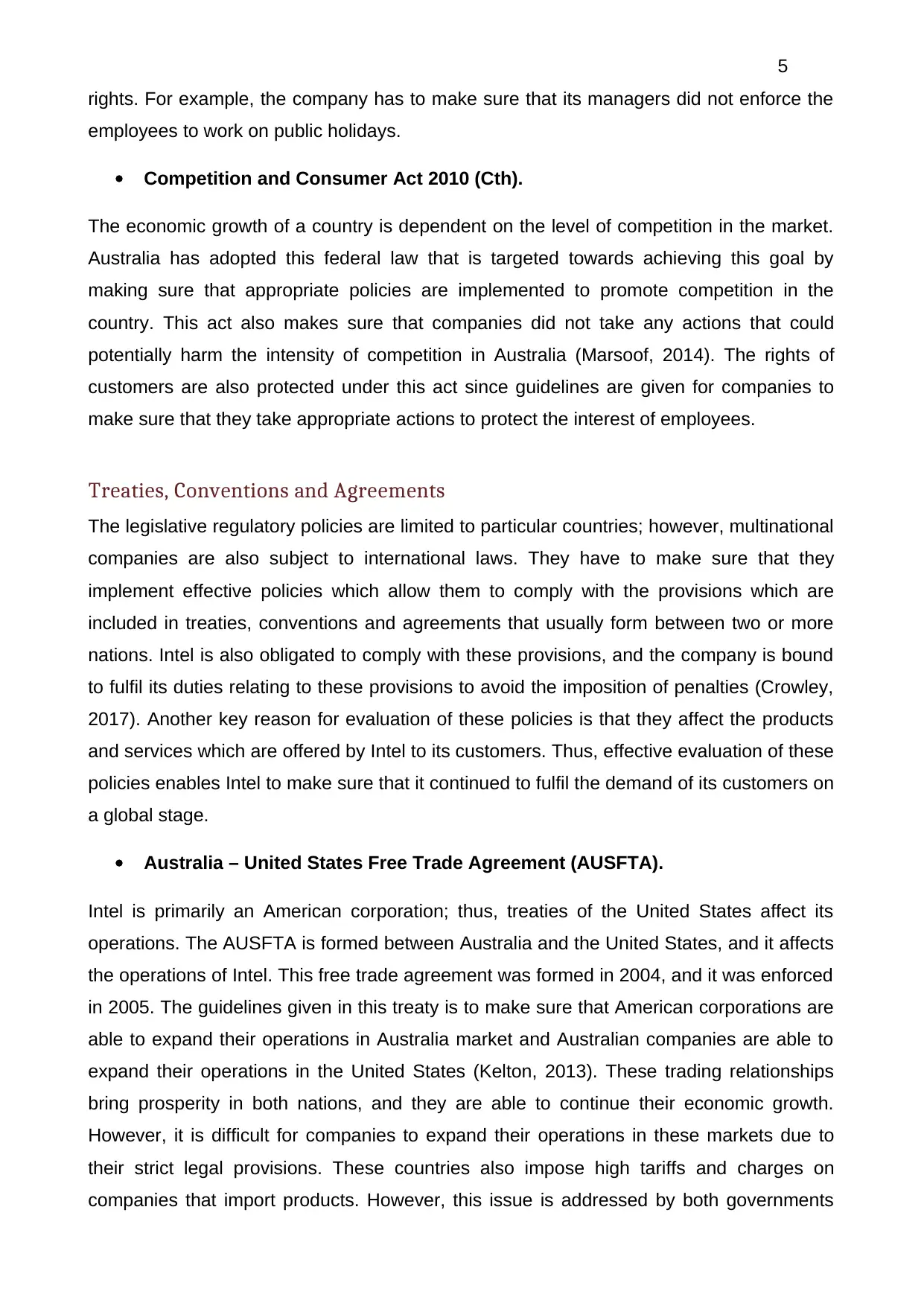
5
rights. For example, the company has to make sure that its managers did not enforce the
employees to work on public holidays.
Competition and Consumer Act 2010 (Cth).
The economic growth of a country is dependent on the level of competition in the market.
Australia has adopted this federal law that is targeted towards achieving this goal by
making sure that appropriate policies are implemented to promote competition in the
country. This act also makes sure that companies did not take any actions that could
potentially harm the intensity of competition in Australia (Marsoof, 2014). The rights of
customers are also protected under this act since guidelines are given for companies to
make sure that they take appropriate actions to protect the interest of employees.
Treaties, Conventions and Agreements
The legislative regulatory policies are limited to particular countries; however, multinational
companies are also subject to international laws. They have to make sure that they
implement effective policies which allow them to comply with the provisions which are
included in treaties, conventions and agreements that usually form between two or more
nations. Intel is also obligated to comply with these provisions, and the company is bound
to fulfil its duties relating to these provisions to avoid the imposition of penalties (Crowley,
2017). Another key reason for evaluation of these policies is that they affect the products
and services which are offered by Intel to its customers. Thus, effective evaluation of these
policies enables Intel to make sure that it continued to fulfil the demand of its customers on
a global stage.
Australia – United States Free Trade Agreement (AUSFTA).
Intel is primarily an American corporation; thus, treaties of the United States affect its
operations. The AUSFTA is formed between Australia and the United States, and it affects
the operations of Intel. This free trade agreement was formed in 2004, and it was enforced
in 2005. The guidelines given in this treaty is to make sure that American corporations are
able to expand their operations in Australia market and Australian companies are able to
expand their operations in the United States (Kelton, 2013). These trading relationships
bring prosperity in both nations, and they are able to continue their economic growth.
However, it is difficult for companies to expand their operations in these markets due to
their strict legal provisions. These countries also impose high tariffs and charges on
companies that import products. However, this issue is addressed by both governments
rights. For example, the company has to make sure that its managers did not enforce the
employees to work on public holidays.
Competition and Consumer Act 2010 (Cth).
The economic growth of a country is dependent on the level of competition in the market.
Australia has adopted this federal law that is targeted towards achieving this goal by
making sure that appropriate policies are implemented to promote competition in the
country. This act also makes sure that companies did not take any actions that could
potentially harm the intensity of competition in Australia (Marsoof, 2014). The rights of
customers are also protected under this act since guidelines are given for companies to
make sure that they take appropriate actions to protect the interest of employees.
Treaties, Conventions and Agreements
The legislative regulatory policies are limited to particular countries; however, multinational
companies are also subject to international laws. They have to make sure that they
implement effective policies which allow them to comply with the provisions which are
included in treaties, conventions and agreements that usually form between two or more
nations. Intel is also obligated to comply with these provisions, and the company is bound
to fulfil its duties relating to these provisions to avoid the imposition of penalties (Crowley,
2017). Another key reason for evaluation of these policies is that they affect the products
and services which are offered by Intel to its customers. Thus, effective evaluation of these
policies enables Intel to make sure that it continued to fulfil the demand of its customers on
a global stage.
Australia – United States Free Trade Agreement (AUSFTA).
Intel is primarily an American corporation; thus, treaties of the United States affect its
operations. The AUSFTA is formed between Australia and the United States, and it affects
the operations of Intel. This free trade agreement was formed in 2004, and it was enforced
in 2005. The guidelines given in this treaty is to make sure that American corporations are
able to expand their operations in Australia market and Australian companies are able to
expand their operations in the United States (Kelton, 2013). These trading relationships
bring prosperity in both nations, and they are able to continue their economic growth.
However, it is difficult for companies to expand their operations in these markets due to
their strict legal provisions. These countries also impose high tariffs and charges on
companies that import products. However, this issue is addressed by both governments
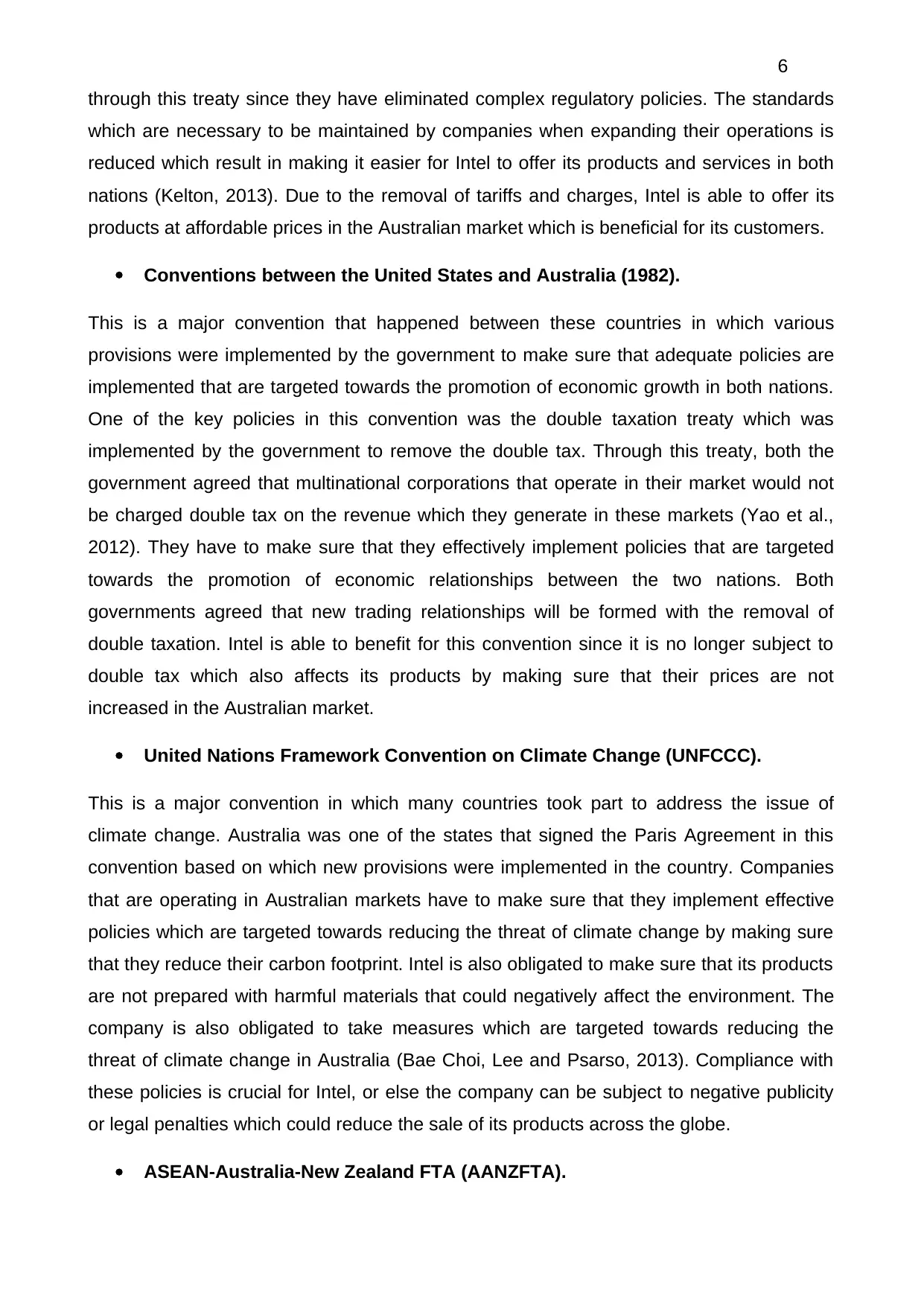
6
through this treaty since they have eliminated complex regulatory policies. The standards
which are necessary to be maintained by companies when expanding their operations is
reduced which result in making it easier for Intel to offer its products and services in both
nations (Kelton, 2013). Due to the removal of tariffs and charges, Intel is able to offer its
products at affordable prices in the Australian market which is beneficial for its customers.
Conventions between the United States and Australia (1982).
This is a major convention that happened between these countries in which various
provisions were implemented by the government to make sure that adequate policies are
implemented that are targeted towards the promotion of economic growth in both nations.
One of the key policies in this convention was the double taxation treaty which was
implemented by the government to remove the double tax. Through this treaty, both the
government agreed that multinational corporations that operate in their market would not
be charged double tax on the revenue which they generate in these markets (Yao et al.,
2012). They have to make sure that they effectively implement policies that are targeted
towards the promotion of economic relationships between the two nations. Both
governments agreed that new trading relationships will be formed with the removal of
double taxation. Intel is able to benefit for this convention since it is no longer subject to
double tax which also affects its products by making sure that their prices are not
increased in the Australian market.
United Nations Framework Convention on Climate Change (UNFCCC).
This is a major convention in which many countries took part to address the issue of
climate change. Australia was one of the states that signed the Paris Agreement in this
convention based on which new provisions were implemented in the country. Companies
that are operating in Australian markets have to make sure that they implement effective
policies which are targeted towards reducing the threat of climate change by making sure
that they reduce their carbon footprint. Intel is also obligated to make sure that its products
are not prepared with harmful materials that could negatively affect the environment. The
company is also obligated to take measures which are targeted towards reducing the
threat of climate change in Australia (Bae Choi, Lee and Psarso, 2013). Compliance with
these policies is crucial for Intel, or else the company can be subject to negative publicity
or legal penalties which could reduce the sale of its products across the globe.
ASEAN-Australia-New Zealand FTA (AANZFTA).
through this treaty since they have eliminated complex regulatory policies. The standards
which are necessary to be maintained by companies when expanding their operations is
reduced which result in making it easier for Intel to offer its products and services in both
nations (Kelton, 2013). Due to the removal of tariffs and charges, Intel is able to offer its
products at affordable prices in the Australian market which is beneficial for its customers.
Conventions between the United States and Australia (1982).
This is a major convention that happened between these countries in which various
provisions were implemented by the government to make sure that adequate policies are
implemented that are targeted towards the promotion of economic growth in both nations.
One of the key policies in this convention was the double taxation treaty which was
implemented by the government to remove the double tax. Through this treaty, both the
government agreed that multinational corporations that operate in their market would not
be charged double tax on the revenue which they generate in these markets (Yao et al.,
2012). They have to make sure that they effectively implement policies that are targeted
towards the promotion of economic relationships between the two nations. Both
governments agreed that new trading relationships will be formed with the removal of
double taxation. Intel is able to benefit for this convention since it is no longer subject to
double tax which also affects its products by making sure that their prices are not
increased in the Australian market.
United Nations Framework Convention on Climate Change (UNFCCC).
This is a major convention in which many countries took part to address the issue of
climate change. Australia was one of the states that signed the Paris Agreement in this
convention based on which new provisions were implemented in the country. Companies
that are operating in Australian markets have to make sure that they implement effective
policies which are targeted towards reducing the threat of climate change by making sure
that they reduce their carbon footprint. Intel is also obligated to make sure that its products
are not prepared with harmful materials that could negatively affect the environment. The
company is also obligated to take measures which are targeted towards reducing the
threat of climate change in Australia (Bae Choi, Lee and Psarso, 2013). Compliance with
these policies is crucial for Intel, or else the company can be subject to negative publicity
or legal penalties which could reduce the sale of its products across the globe.
ASEAN-Australia-New Zealand FTA (AANZFTA).
Paraphrase This Document
Need a fresh take? Get an instant paraphrase of this document with our AI Paraphraser
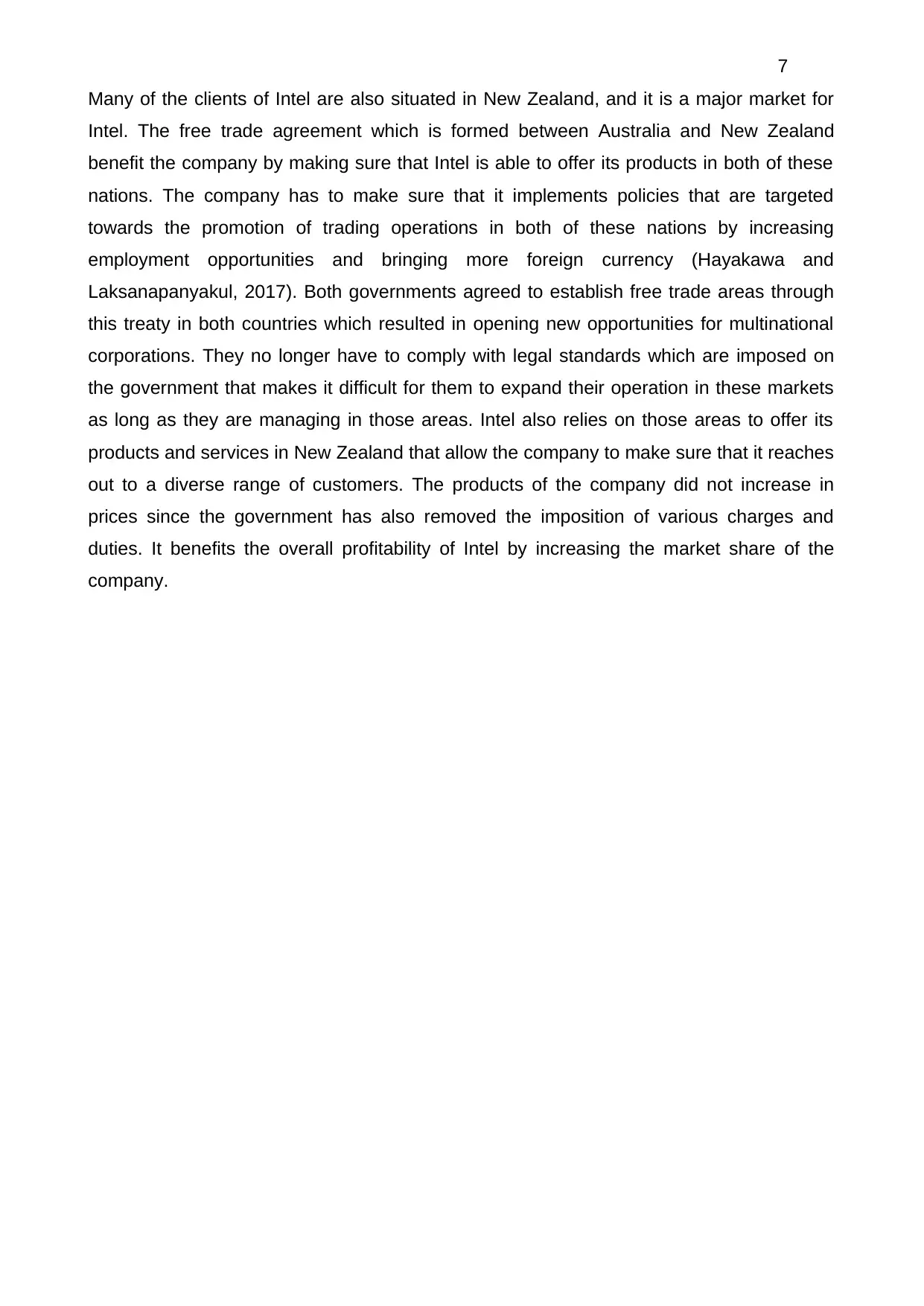
7
Many of the clients of Intel are also situated in New Zealand, and it is a major market for
Intel. The free trade agreement which is formed between Australia and New Zealand
benefit the company by making sure that Intel is able to offer its products in both of these
nations. The company has to make sure that it implements policies that are targeted
towards the promotion of trading operations in both of these nations by increasing
employment opportunities and bringing more foreign currency (Hayakawa and
Laksanapanyakul, 2017). Both governments agreed to establish free trade areas through
this treaty in both countries which resulted in opening new opportunities for multinational
corporations. They no longer have to comply with legal standards which are imposed on
the government that makes it difficult for them to expand their operation in these markets
as long as they are managing in those areas. Intel also relies on those areas to offer its
products and services in New Zealand that allow the company to make sure that it reaches
out to a diverse range of customers. The products of the company did not increase in
prices since the government has also removed the imposition of various charges and
duties. It benefits the overall profitability of Intel by increasing the market share of the
company.
Many of the clients of Intel are also situated in New Zealand, and it is a major market for
Intel. The free trade agreement which is formed between Australia and New Zealand
benefit the company by making sure that Intel is able to offer its products in both of these
nations. The company has to make sure that it implements policies that are targeted
towards the promotion of trading operations in both of these nations by increasing
employment opportunities and bringing more foreign currency (Hayakawa and
Laksanapanyakul, 2017). Both governments agreed to establish free trade areas through
this treaty in both countries which resulted in opening new opportunities for multinational
corporations. They no longer have to comply with legal standards which are imposed on
the government that makes it difficult for them to expand their operation in these markets
as long as they are managing in those areas. Intel also relies on those areas to offer its
products and services in New Zealand that allow the company to make sure that it reaches
out to a diverse range of customers. The products of the company did not increase in
prices since the government has also removed the imposition of various charges and
duties. It benefits the overall profitability of Intel by increasing the market share of the
company.
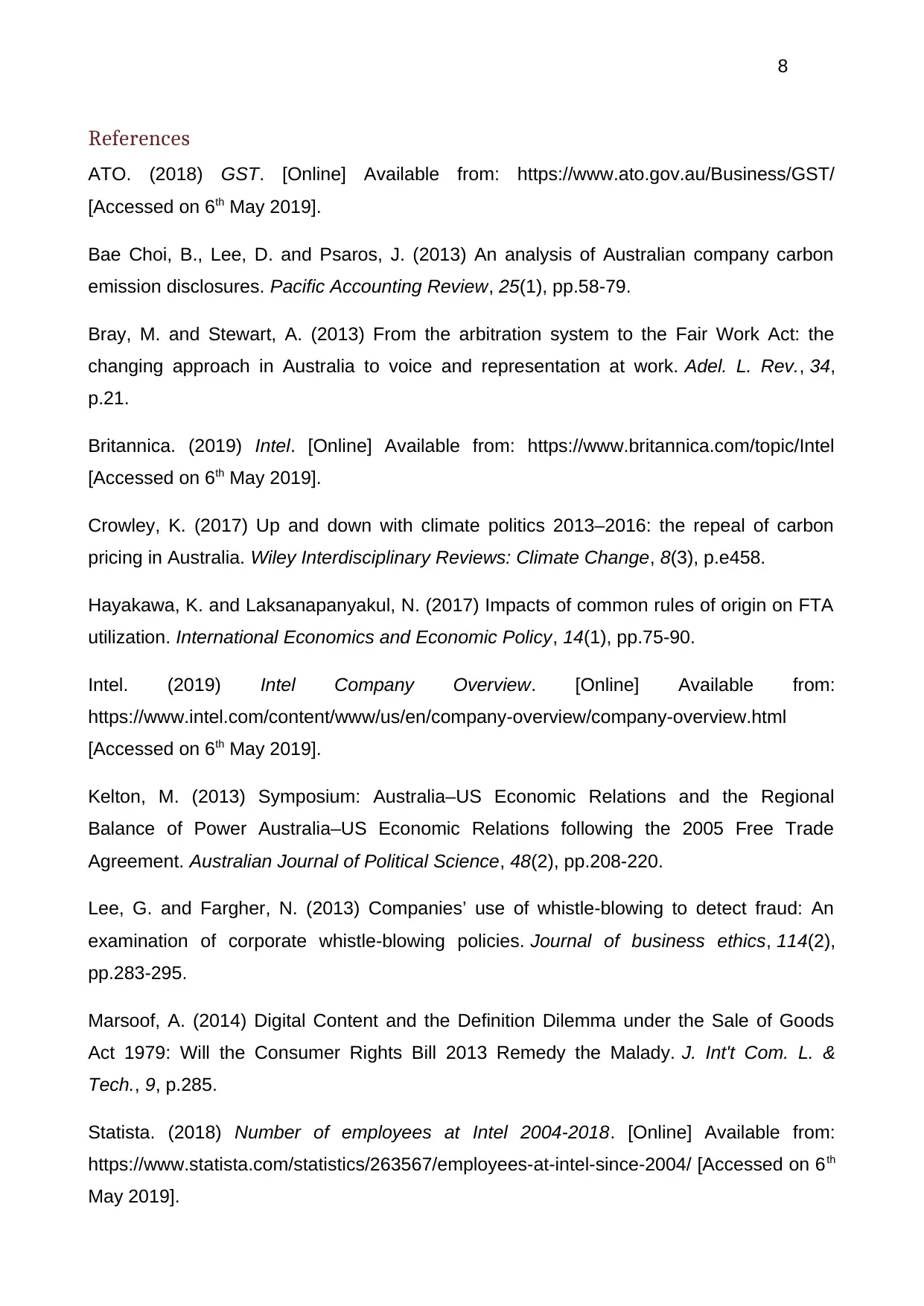
8
References
ATO. (2018) GST. [Online] Available from: https://www.ato.gov.au/Business/GST/
[Accessed on 6th May 2019].
Bae Choi, B., Lee, D. and Psaros, J. (2013) An analysis of Australian company carbon
emission disclosures. Pacific Accounting Review, 25(1), pp.58-79.
Bray, M. and Stewart, A. (2013) From the arbitration system to the Fair Work Act: the
changing approach in Australia to voice and representation at work. Adel. L. Rev., 34,
p.21.
Britannica. (2019) Intel. [Online] Available from: https://www.britannica.com/topic/Intel
[Accessed on 6th May 2019].
Crowley, K. (2017) Up and down with climate politics 2013–2016: the repeal of carbon
pricing in Australia. Wiley Interdisciplinary Reviews: Climate Change, 8(3), p.e458.
Hayakawa, K. and Laksanapanyakul, N. (2017) Impacts of common rules of origin on FTA
utilization. International Economics and Economic Policy, 14(1), pp.75-90.
Intel. (2019) Intel Company Overview. [Online] Available from:
https://www.intel.com/content/www/us/en/company-overview/company-overview.html
[Accessed on 6th May 2019].
Kelton, M. (2013) Symposium: Australia–US Economic Relations and the Regional
Balance of Power Australia–US Economic Relations following the 2005 Free Trade
Agreement. Australian Journal of Political Science, 48(2), pp.208-220.
Lee, G. and Fargher, N. (2013) Companies’ use of whistle-blowing to detect fraud: An
examination of corporate whistle-blowing policies. Journal of business ethics, 114(2),
pp.283-295.
Marsoof, A. (2014) Digital Content and the Definition Dilemma under the Sale of Goods
Act 1979: Will the Consumer Rights Bill 2013 Remedy the Malady. J. Int't Com. L. &
Tech., 9, p.285.
Statista. (2018) Number of employees at Intel 2004-2018. [Online] Available from:
https://www.statista.com/statistics/263567/employees-at-intel-since-2004/ [Accessed on 6th
May 2019].
References
ATO. (2018) GST. [Online] Available from: https://www.ato.gov.au/Business/GST/
[Accessed on 6th May 2019].
Bae Choi, B., Lee, D. and Psaros, J. (2013) An analysis of Australian company carbon
emission disclosures. Pacific Accounting Review, 25(1), pp.58-79.
Bray, M. and Stewart, A. (2013) From the arbitration system to the Fair Work Act: the
changing approach in Australia to voice and representation at work. Adel. L. Rev., 34,
p.21.
Britannica. (2019) Intel. [Online] Available from: https://www.britannica.com/topic/Intel
[Accessed on 6th May 2019].
Crowley, K. (2017) Up and down with climate politics 2013–2016: the repeal of carbon
pricing in Australia. Wiley Interdisciplinary Reviews: Climate Change, 8(3), p.e458.
Hayakawa, K. and Laksanapanyakul, N. (2017) Impacts of common rules of origin on FTA
utilization. International Economics and Economic Policy, 14(1), pp.75-90.
Intel. (2019) Intel Company Overview. [Online] Available from:
https://www.intel.com/content/www/us/en/company-overview/company-overview.html
[Accessed on 6th May 2019].
Kelton, M. (2013) Symposium: Australia–US Economic Relations and the Regional
Balance of Power Australia–US Economic Relations following the 2005 Free Trade
Agreement. Australian Journal of Political Science, 48(2), pp.208-220.
Lee, G. and Fargher, N. (2013) Companies’ use of whistle-blowing to detect fraud: An
examination of corporate whistle-blowing policies. Journal of business ethics, 114(2),
pp.283-295.
Marsoof, A. (2014) Digital Content and the Definition Dilemma under the Sale of Goods
Act 1979: Will the Consumer Rights Bill 2013 Remedy the Malady. J. Int't Com. L. &
Tech., 9, p.285.
Statista. (2018) Number of employees at Intel 2004-2018. [Online] Available from:
https://www.statista.com/statistics/263567/employees-at-intel-since-2004/ [Accessed on 6th
May 2019].
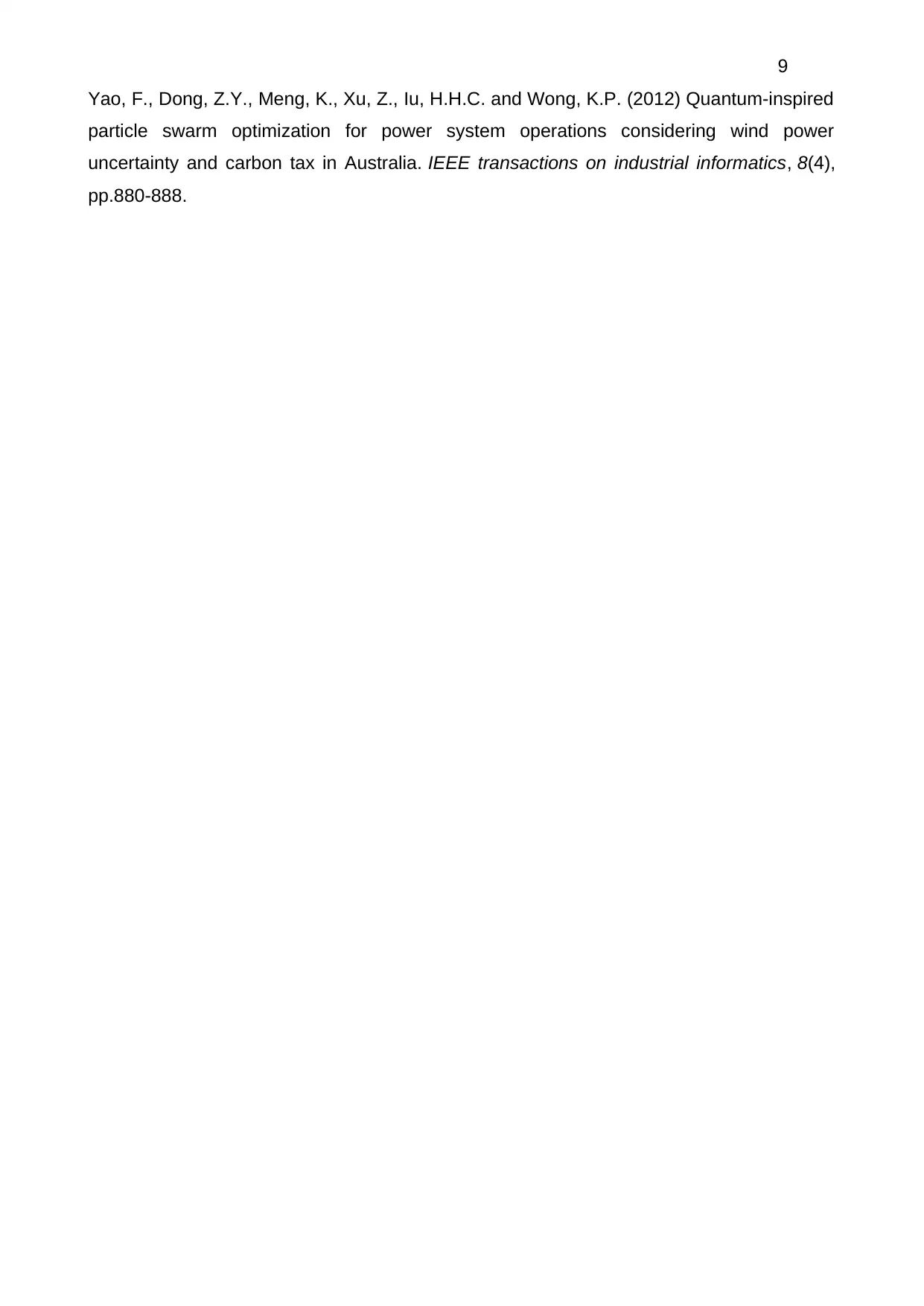
9
Yao, F., Dong, Z.Y., Meng, K., Xu, Z., Iu, H.H.C. and Wong, K.P. (2012) Quantum-inspired
particle swarm optimization for power system operations considering wind power
uncertainty and carbon tax in Australia. IEEE transactions on industrial informatics, 8(4),
pp.880-888.
Yao, F., Dong, Z.Y., Meng, K., Xu, Z., Iu, H.H.C. and Wong, K.P. (2012) Quantum-inspired
particle swarm optimization for power system operations considering wind power
uncertainty and carbon tax in Australia. IEEE transactions on industrial informatics, 8(4),
pp.880-888.
1 out of 10
Related Documents
Your All-in-One AI-Powered Toolkit for Academic Success.
+13062052269
info@desklib.com
Available 24*7 on WhatsApp / Email
![[object Object]](/_next/static/media/star-bottom.7253800d.svg)
Unlock your academic potential
© 2024 | Zucol Services PVT LTD | All rights reserved.





